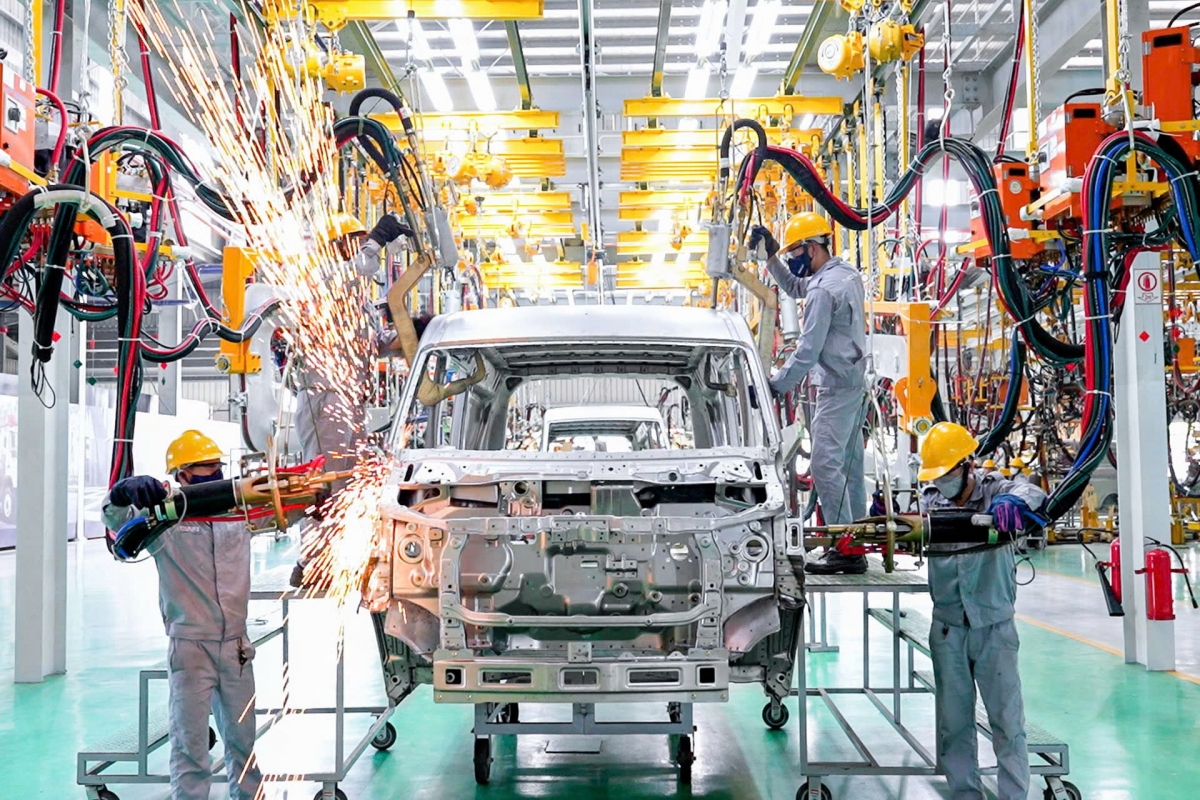
VOV.VN - Vietnam’s private sector is increasingly growing and becoming a leading driver of economic growth, with many businesses showing their willingness to engage in mega projects.

Upholding the spirit of “thinking big, doing big,” the local private sector has accelerated strongly in recent times as evidenced by the development of powerful brands. Some of the brands to name include Vinamilk which is the sixth largest dairy brand in the world, Deo Ca that has mastered complex tunnel construction technologies, Hoa Phat that manufactures and exports various steel products, and FPT that is one of Vietnam’s largest technology enterprises.
The private sector had played a secondary role in the economy until major policy resolutions were introduced, including Politburo Resolution 09 issued in 2011 and Politburo Resolution 10 issued in 2017. With the enforcement of the two important resolutions, private enterprises have made spectacular breakthroughs, becoming the leading force for national economic growth.
Currently, the private sector boasts nearly one million enterprises and around five million individual business households. These enterprises contribute 51% of the country’s GDP, over 30% of state budget revenue, and nearly 60% of total social investment capital, while creating jobs for more than 40 million workers.
Immediately after the Lunar New Year 2025, the Government held a meeting with State-owned enterprises, commercial banks, private enterprises, and small and medium-sized businesses to discuss ways to remove obstacles and support business development. The private sector’s engagement in the meeting showed the government values its contributions to the national economy.
Vietnam is streamlining the administrative system, setting an 8% GDP growth target for 2025 and aiming for double-digit growth in subsequent years. It is about to implement major projects such as the North-South high-speed railway, three standard-gauge railway lines connecting with China, and nuclear power plants.
Many private businesses have expressed their willingness to engage in national mega projects. For instance, Hoa Phat is ready to produce railway tracks for the North-South high-speed rail project, Deo Ca to construct tunnels, Truong Hai (THACO) to manufacture train carriages, and FPT to train high-quality human resources and design semiconductor chips.
Ho Minh Hoang, chairman of Deo Ca Group, expressed his hope that the Government would commission private enterprises to participate in key national projects. Meanwhile, Tran Dinh Long, chairman of Hoa Phat Group, stated that Hoa Phat is willing to invest VND10 trillion in a railway track manufacturing plant. These commitments demonstrate the confidence and readiness of private enterprises to contribute to major national projects.
In his recently published article, Party General Secretary To Lam affirmed that the upcoming Politburo resolution on the private sector would encourage, support, and guide its development, creating a breakthrough force and ushering in a new era for Vietnamese private enterprises.
From policy frameworks to legal regulations, Vietnam has been establishing a favourable environment for private sector development. The increasing involvement of private enterprises in major national projects, once dominated by State-owned enterprises, delivers a clear message that all economic sectors have equal opportunities, with efficiency and quality being the top priorities and the state playing a facilitating and supportive role.

The participation of leading private enterprises such as Hoa Phat, THACO, Deo Ca, Viettel, and FPT in national projects is an encouraging signal, demonstrating that the private sector is now capable of undertaking large-scale and complex projects. It is no coincidence that the Prime Minister commissioned Hoa Phat to manufacture railway tracks and THACO to produce train carriages.
From a national governance perspective, it is evident that the Government fully recognizes and trusts the role of private enterprises, providing them with opportunities to contribute as key pillars of the economy.
One of the private sector’s key advantages is its agility, as it is not constrained by a cumbersome bureaucracy. This enables quick decision-making, rapid implementation, resource efficiency, and high effectiveness.
Beyond expanding manufacturing, trade, and services, the private sector drives innovation, enhances productivity, and fosters healthy competition, compelling other economic sectors to modernize and improve their capabilities.
The strong growth of many Vietnamese private enterprises not only strengthens the domestic market but also enhances their presence in the global arena. This proves that, given the right environment, Vietnamese enterprises can compete confidently and thrive internationally.
Despite its strengths and contributions, the private sector still faces significant challenges, including limited access to capital, land constraints, lack of transparency in support mechanisms, and inconsistencies in legal frameworks across different levels and industries. These obstacles have hindered many potential enterprises from fully expanding their capabilities and made it difficult for some businesses to withstand the increasingly fierce competition.
However, the private sector’s confidence in engaging in the North-South high-speed railway project and mastering new technologies not only contributes to modernizing the country’s railway infrastructure but also serves as a testament to its ability to play a crucial role in national mega projects such as the high-speed railway system.
With its maturity, confidence, and technological capabilities, the private sector is now stepping into major national projects not just as subcontractors but as key players, helping to create jobs, develop supporting industries, and increase labour productivity. Apparently, Vietnamese enterprises have the ambition, competence, and determination to realize national strategic projects using their own intellect, skills, and resources.
VOV.VN - The Ministry of Finance (MoF) will draft a new resolution on breakthrough mechanisms and policies for the development of the private economic sector, in an effort to create more favourable conditions for private enterprises to grow and contribute to the national economy.
VOV.VN - Party General Secretary To Lam has affirmed in a recently issued article that the private sector plays a very important role in shaping the future of the national economy and building a dynamic, independent, resilient, and prosperous Vietnam in the new era of national advancement.
VOV.VN - Private firms in Vietnam continue to face challenges in accessing development resources, prompting calls for more equitable policies across business sectors, according to industry insiders.
Bình luận
Bình luận của bạn sẽ được xét duyệt trước khi đăng